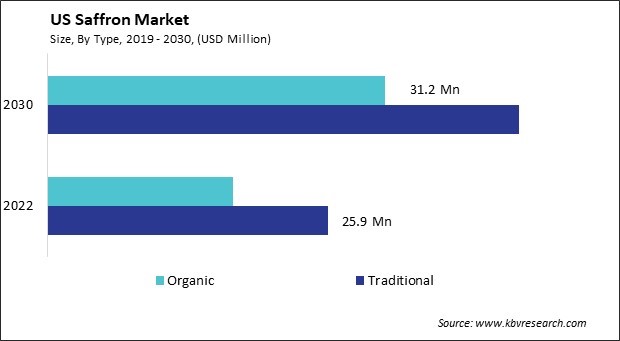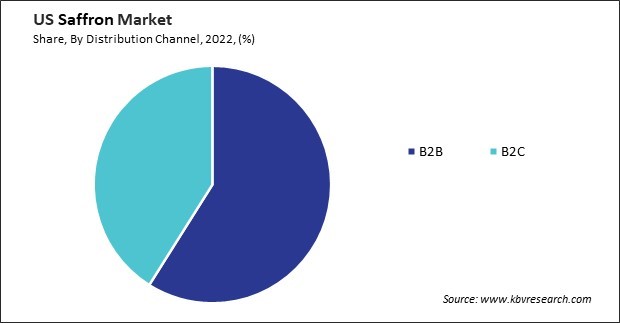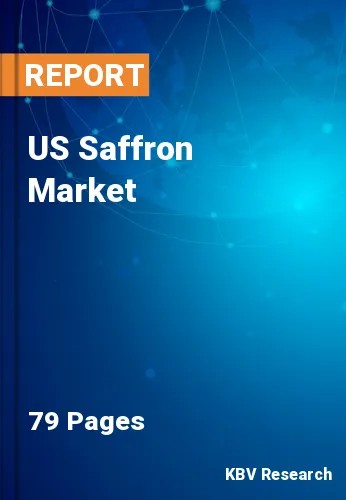The US Saffron Market size is expected to reach $74.7 Million by 2030, rising at a market growth of 7.3% CAGR during the forecast period. In the year 2022, the market attained a volume of 63.9 Tonnes, experiencing a growth of 6.8% (2019-2022).
The saffron market in the United States reflects a fascinating intersection of history, culture, and economics. Despite its origins in regions like Iran, India, and Spain, saffron has found a niche within the diverse tapestry of American cuisine, contributing to a burgeoning industry driven by a combination of traditional usage, evolving culinary trends, and increasing consumer awareness of its unique properties. Saffron has a rich legacy dating back centuries, with mentions in ancient texts and utilization in various civilizations for culinary, medicinal, and even ceremonial purposes. This cultural cachet contributes to saffron's appeal in the American saffron market, particularly among discerning consumers seeking authentic and exotic culinary experiences.

Moreover, the health and wellness trend also significantly drives the saffron market in the U.S. Saffron is valued for its culinary attributes and prized for its potential health benefits. It contains compounds like crocin and safranal, which have antioxidant properties and offer various health advantages, ranging from mood enhancement to anti-inflammatory effects. As Americans become increasingly health-conscious and seek natural remedies and functional foods, saffron is a versatile ingredient that aligns with these preferences.
Furthermore, the accessibility of saffron market in the U.S. has expanded with the proliferation of specialty food stores, gourmet industries, and online retailers. While once considered a rare and exotic spice reserved for special occasions, saffron has become more readily available to American consumers, albeit at a premium price compared to other spices. However, the COVID-19 pandemic has significantly impacted the saffron market in the U.S., disrupting global supply chains and leading to shortages and price fluctuations. Additionally, economic uncertainty and changes in consumer behavior have affected demand for premium food products like saffron, with some consumers prioritizing essential items over luxury ingredients.
The saffron market in the United States is experiencing a notable shift driven by a rising demand for organic food products. As American consumers become increasingly aware of organic foods' potential health and environmental benefits, they actively seek organic options across various food categories, including saffron. Amidst a growing trend of heightened consumer interest in organic food products, the saffron market in the U.S. has seen a surge in demand.
According to the U.S. Department of Agriculture, the organic food products sector in the United States has witnessed remarkable expansion, boasting sales of approximately $26.9 billion in 2010 and soaring to $52.0 billion by 2021. This surge parallels the increasing appetite for organic food items in the saffron market within the U.S.
One key factor fueling the demand for organic saffron is growing concerns about using synthetic pesticides, fertilizers, and other chemicals in conventional agriculture. Organic farming practices prioritize natural pest control, soil fertility management, and weed suppression. This appeals to U.S. consumers who prioritize the avoidance of potentially harmful chemicals in their food and are willing to pay a premium for products produced by organic standards.
In addition to health and environmental considerations, the demand for organic saffron is also driven by factors such as flavor and quality. Many U.S. consumers perceive organic products to have superior taste and aroma to their conventionally grown counterparts. To meet the growing demand for organic saffron, producers and suppliers in the U.S. are increasingly investing in organic certification and expanding their organic farming operations. Thus, the increasing demand for organic saffron in the United States reflects a growing consumer preference for healthier, environmentally friendly, and higher-quality food options.
In recent years, the culinary landscape of the United States has undergone a significant transformation, marked by a burgeoning interest in international cuisines. Traditionally associated with Mediterranean and Middle Eastern cuisines, saffron has found its way into the kitchens of chefs and home cooks in the U.S., adding depth and complexity to a diverse array of dishes. This growing fascination with saffron mirrors a broader trend of culinary exploration and a desire for authentic flavors from around the globe.
One driving force behind the increasing popularity of saffron in the U.S. is the growing awareness of its health benefits. Renowned for its antioxidant properties and potential medicinal uses, saffron has captured the attention of health-conscious Americans seeking natural remedies and wellness-promoting ingredients. The versatility of saffron further contributes to its appeal, as it lends itself to many culinary applications, from savory rice dishes like paella and risotto to indulgent desserts such as saffron-infused ice cream and cakes.
Furthermore, the rise of food tourism and social media has fueled interest in exotic ingredients like saffron as consumers seek to recreate their culinary experiences online and during their travels. As a result, specialty food stores and gourmet industries across the U.S. are experiencing a surge in demand for saffron, catering to a diverse clientele eager to experiment with new flavors and ingredients. Hence, the growing popularity of saffron in the United States reflects a broader trend of culinary exploration driven by a desire for authentic flavors and the influence of food tourism and social media.

The saffron market in the United States is a niche yet significant sector within the broader spice industry. One notable player in the U.S. saffron market is Rumi Spice, a company founded by U.S. military veterans who served in Afghanistan. Rumi Spice sources its saffron directly from Afghan farmers, aiming to support local agricultural communities while providing high-quality saffron to consumers. The company emphasizes transparency and sustainability in its operations, highlighting the traceability of its saffron from farm to table. Rumi Spice's commitment to quality and social impact has earned it recognition and partnerships with renowned chefs and culinary experts nationwide.
Saffronice is a California-based company that stands out in the U.S. saffron market for its commitment to organic farming practices and environmental sustainability. The brand cultivates saffron using organic methods, free from synthetic pesticides and fertilizers, ensuring a pure and natural product. Saffronice's saffron farms are in ideal growing conditions, allowing exceptional quality saffron cultivation. The company's emphasis on sustainability resonates with environmentally conscious consumers seeking ethically produced saffron products.
Additionally, Kashmir Saffron Company is a key player in the U.S. saffron market, specializing in premium saffron sourced from the picturesque region of Kashmir in India. Known for its superior quality and distinct floral aroma, Kashmiri saffron is highly sought by chefs and culinary enthusiasts worldwide. Kashmir Saffron Company prides itself on offering handpicked, carefully selected saffron threads of the highest grade to meet stringent quality standards. The company's commitment to authenticity and tradition has made it a preferred choice among discerning consumers looking for the finest saffron available in the industry.
Furthermore, Silk Road Saffron is a U.S.-based company that imports saffron from multiple origins, including Iran, Greece, and Morocco, to offer customers a diverse range of saffron products. Silk Road Saffron's product line includes various grades of saffron, catering to different culinary preferences and budgetary considerations. The company's extensive sourcing network ensures a consistent supply of saffron year-round, enabling it to meet the demands of its diverse customer base across the U.S. Silk Road Saffron's commitment to quality, variety, and accessibility has solidified its position as a leading supplier in the U.S. saffron market. Whether through their commitment to social impact, sustainability, or product variety, these companies contribute to the vibrancy and growth of the saffron industry in the United States.
By Type
By Distribution Channel
By Application
By Form
By Grade Type
Our team of dedicated experts can provide you with attractive expansion opportunities for your business.

